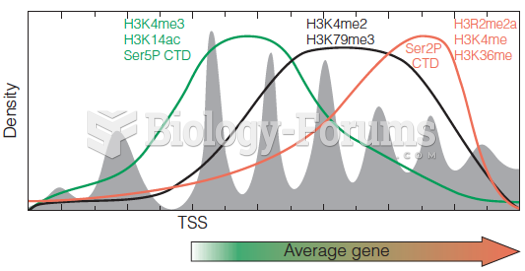|
|
|
Women are 50% to 75% more likely than men to experience an adverse drug reaction.
There are approximately 3 million unintended pregnancies in the United States each year.
The effects of organophosphate poisoning are referred to by using the abbreviations “SLUD” or “SLUDGE,” It stands for: salivation, lacrimation, urination, defecation, GI upset, and emesis.
There used to be a metric calendar, as well as metric clocks. The metric calendar, or "French Republican Calendar" divided the year into 12 months, but each month was divided into three 10-day weeks. Each day had 10 decimal hours. Each hour had 100 decimal minutes. Due to lack of popularity, the metric clocks and calendars were ended in 1795, three years after they had been first marketed.
The heart is located in the center of the chest, with part of it tipped slightly so that it taps against the left side of the chest.






